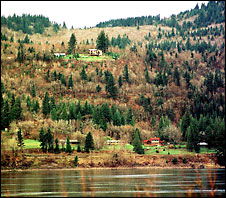|
Ruling
allows couple to keep Gorge dream home, fuels
land-use debate
Friday, June 29, 2001 By
SCOTT SUNDE The Washington Supreme Court has given Brian and Jody Bea back their dream house on the Columbia River Gorge -- and Skamania County a measure of control over what's built inside its borders. Yesterday's unanimous decision is fraught with public-policy questions that dominate debates in the West: private property vs. environmental protection; local control vs. federal authority.
The case is also about the 4,000-square-foot house the Beas started building in 1997 above a breathtaking stretch of the Gorge. They won county approval for the house, which is in a federal scenic area. But months after construction began, the Columbia Gorge Commission objected. It invalidated the county's final land-use ruling, said the Beas' 35-foot-high house was too high and too close to the bluff and ordered it moved 200 feet. The state's highest court ruled the commission didn't have the authority to take that action and that, in effect, it had to follow the rules governing the Columbia River Gorge National Scenic Area like everyone else. "I'm relieved more than anything," Brian Bea said from the rented home in Washougal where he lives with his wife and two sons. The couple is expecting the birth of their third child any day now. "It's bittersweet. You call it a victory. You jump up and down," he said. "But the last three years you had to go through this." The $300,000 house is about 75 percent complete and lacks insulation and wallboard. It is "decaying and rotting" and has been vandalized, Bea said. The next order of business is to finish and repair the house, then move in. "It's nice to know that our new baby won't be homeless."
The family also has to shake off the notoriety that came with being the poster people for private-property rights. "They made us look like some horrible people. My goodness, murderers get better treatment," said Bea, a physician's assistant. Leaders of preservation groups were distressed over the decision and how it might hurt the Gorge, which Congress declared a national scenic area in 1986. "It seems to clearly take away some of the enforcement power of the Gorge Commission," said Kevin Gorman, executive director of Friends of the Columbia Gorge. He said if other big houses are allowed in the Gorge, it will change for the worse. "All of a sudden you wake up one morning and what was a national treasure becomes another resort area like so many others." Gorman said his group is mulling over a possible appeal to the U.S. Supreme Court. The commission issued a statement from its White Salmon headquarters, expressing disappointment at the decision. "This clarifies that the Gorge Commission can correct these types of problems and how the Gorge Commission should do so in the future. Over the next several days, the Gorge Commission will carefully review the court's decision and consider its options, including how to correct the problems of this particular case." In some respects, the case isn't over. Skamania County set out 33 conditions that the Beas had to follow in building their house. They haven't followed some, and the county admits it didn't do much of a job making sure the Beas complied. Enforcement of those conditions on such items as cutting down trees and excavating may be taken up by the county and commission, said Brad Andersen, Skamania County prosecutor. But for the moment, the Beas' lawyer sees the ruling as a victory for property rights. John Groen, a Bellevue attorney, said the court underscored the importance of final decisions in land-use questions. "There has to be a certainty and not have the rug pulled out from under you," said Groen. He represented the Beas on behalf of Pacific Legal Foundation, a non-profit group that focuses on private-property rights. At issue in the Beas' case wasn't the Gorge Commission's authority over what they did with their land. Rather, it was how and when the commission used that authority. The Beas applied to Skamania County in November 1996 for permission to build their home on land Brian Bea's great-grandfather homesteaded. The county followed the land-use rules for the scenic area that the commission had approved. The county approved the house in May 1997 with the 33 conditions. Along the way, the county notified the commission and others. The county allows land-use decisions to be appealed to its Board of Adjustment within 20 days. Decisions can also be taken to the Gorge Commission 30 days after a decision. Neither happened in this case. The house, however, sparked controversy after construction began. Some people say the house was too visible and ruined scenic vistas. The Gorge Commission took up the complaints and ruled in July 1998 that the county's approval violated the federal law setting up the scenic area. The commission has 12 voting members: six from Washington and six from Oregon. But Supreme Court justices held that the commission should have followed the rules of appeal. "In short, the litigation in which the parties are embroiled could have been avoided had the Gorge Commission become involved in the process earlier, taking advantage of the comment and appeals period," Chief Justice Gerry Alexander wrote. The law, Alexander said, "does not authorize the Gorge Commission to collaterally invalidate final county land-use decision." The decision strikes a pleasant chord in Skamania County, where citizens were so upset about federal control of the Gorge that they flew the courthouse flag at half-staff in 1986 when President Reagan signed the bill to create the scenic area. "This is a victory for local control and property rights," Andersen, the county prosecutor said. "This brings the Gorge Commission back to earth and says you are bound by the same rules that the counties are bound by." Andersen said he tried to persuade the commission that it shouldn't invalidate the county's decision on the Beas' home. Instead, he suggested that the commission should order the county to enforce its conditions on the Beas' home. Rather than working with the county, commission members "continued to think they had this awesome power" and "launched grenades" at the county, he said.
P-I reporter Scott Sunde can be reached at 206-448-8331 or scottsunde@seattlepi.com In accordance with Title 17 U.S.C. Section 107, any copyrighted work in this message is distributed under fair use without profit or payment for non-profit research and educational purposes only. [Ref. http://www.law.cornell.edu/uscode/17/107.shtml]
|

